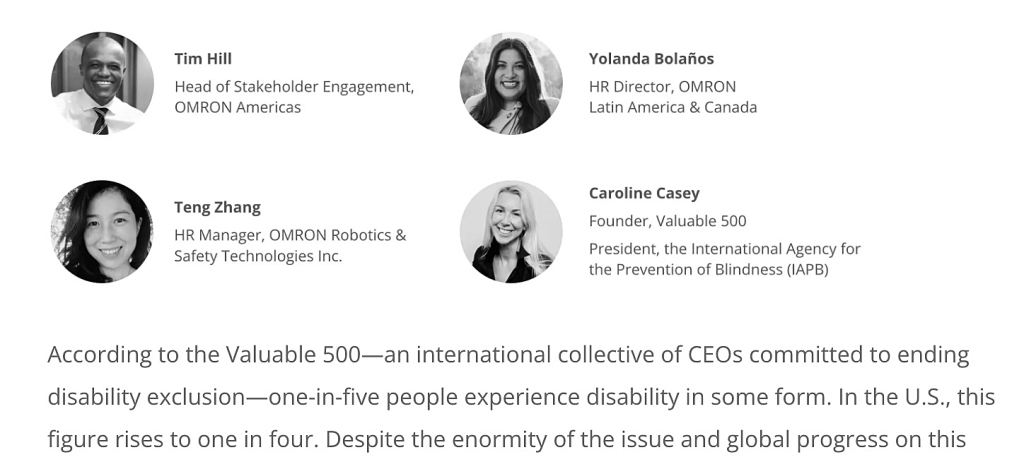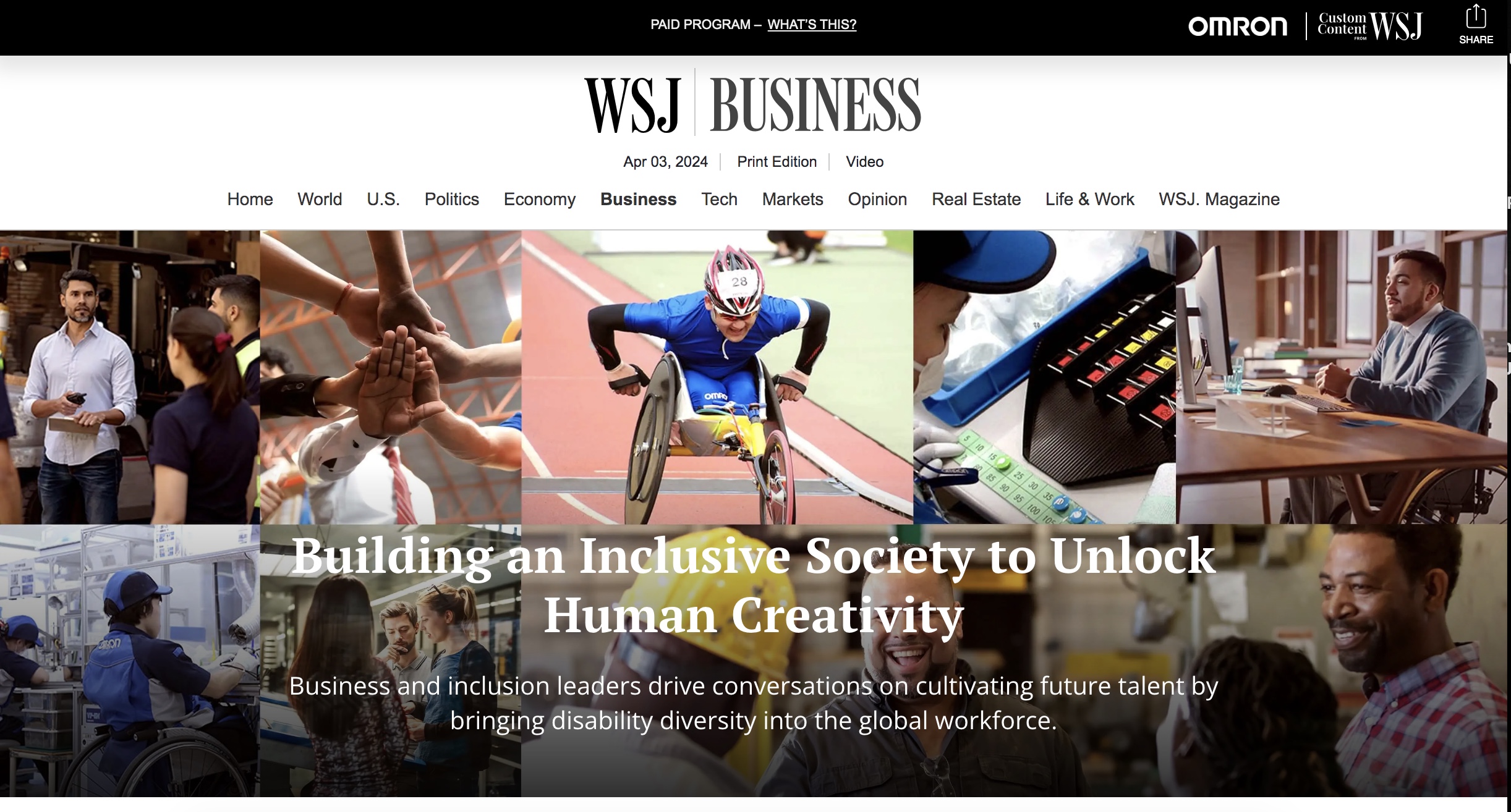Wall Street Journal – OMRON and Building an Inclusive Society
Here’s a link to an interview I did recently with OMRON America’s Tim Hill, OMRON Latin America’s Yolanda Bolanos, Teng Zeng at OMRON Robotics and Caroline Casey, Founder of the Valuable 500. It was a pleasure to interview such committed supporters of DEI and people with disabilities worldwide. https://partners.wsj.com/omron/innovating-for-tomorrow/building-an-inclusive-society-to-unlock-human-creativity It is free to read for all.
At the WSJ page, you can click on certain segments of the interview to hear the speakers in more detail. Below is a taster of the full text.


According to the Valuable 500—an international collective of CEOs committed to ending disability exclusion—one-in-five people experience disability in some form. In the U.S., this figure rises to one in four. Despite the enormity of the issue and global progress on this front, professional opportunities for disabled workers remain severely limited in some countries and sectors.
“In my view, DEI is about nurturing diverse perspectives, giving equal importance to each opinion and creating a workplace where everyone can express themselves,” says Christina Connelly, VP of Human Resources at OMRON Americas and Executive Sponsor of its DEI Workgroup.
Connelly explains that as firm supporters of equitable practices for over five decades, the global technology leader “brings together people with different abilities, personalities and perspectives, and empowers them to take on challenges while creating value for society.”
Understanding that DEI efforts require ongoing discussion, four experts from around the world came together to share the challenges, outcomes and hopes associated with inclusive integration. The following conversation features Tim Hill, Head of Stakeholder Engagement at OMRON Americas; Yolanda Bolaños, HR Director at OMRON Latin America & Canada; Teng Zhang, HR Manager at OMRON Robotics & Safety Technologies Inc.; and Caroline Casey, Founder of the Valuable 500.
According to the Valuable 500—an international collective of CEOs committed to ending disability exclusion—one-in-five people experience disability in some form. In the U.S., this figure rises to one in four. Despite the enormity of the issue and global progress on this front, professional opportunities for disabled workers remain severely limited in some countries and sectors.
“In my view, DEI is about nurturing diverse perspectives, giving equal importance to each opinion and creating a workplace where everyone can express themselves,” says Christina Connelly, VP of Human Resources at OMRON Americas and Executive Sponsor of its DEI Workgroup.
Connelly explains that as firm supporters of equitable practices for over five decades, the global technology leader “brings together people with different abilities, personalities and perspectives, and empowers them to take on challenges while creating value for society.”
Understanding that DEI efforts require ongoing discussion, four experts from around the world came together to share the challenges, outcomes and hopes associated with inclusive integration. The following conversation features Tim Hill, Head of Stakeholder Engagement at OMRON Americas; Yolanda Bolaños, HR Director at OMRON Latin America & Canada; Teng Zhang, HR Manager at OMRON Robotics & Safety Technologies Inc.; and Caroline Casey, Founder of the Valuable 500.
How can companies ensure the voices of disabled employees are consistently spotlighted?
CC: First, I want to pick up on the fear of the language around disability. “Disability” covers a vast spectrum of lived experiences, and it’s okay to say the word. Sometimes, discomfort with the language can mask this diversity. I am registered legally blind, but my experience is incomparable to those of others. Eighty percent of disability is unseen, so unless there are what Yolanda describes as “safe spaces” for employees to self-declare disability, normalization is impossible. That’s why we need to demystify these terms through meaningful conversations and accessible services that elevate those voices.
Tim Hill: These perspectives can also be platformed in ways that offer more human connection. One of our HR analysts, Keigo Tozawa—also a member of our Americas DEI workgroup—underwent inclusive leadership training and experiential learning at OMRON Taiyo in Kyushu, Japan. He discovered a system started by a mentally disabled employee who struggled with expressing himself: workers would write their daily feelings and concerns on a whiteboard, in a highly visible area on the factory floor. This exercise helped employees relate to one another and was a valuable best practice shared with our workgroup. That’s why disabilities shouldn’t be magnified as weaknesses. We encourage all employees to transform their unique potential into value through mutual knowledge, cooperation and ingenuity.
How does inclusivity drive business outcomes?
YB: We see this not only from a business perspective, but a societal one. Some governments and organizations are trying to bring disabled people to the table. At the same time, OMRON has been pioneering inclusivity for over 50 years—it’s a collaboration between business and society.
CC: What business values and includes, society follows. There is no chance that we’re going to end the exclusion crisis without organizations like OMRON because when they share what they’re willing to learn from us, that will trickle into society. Business is the most powerful force for change on this planet, and you can’t force integration unless companies understand the value. The consumer spending power in this market is $13 trillion. Leaders are realizing that to serve those markets and as a point of growth and differentiation, they need this talent in their ranks.
To read the entire article please go to the WSJ Page linked here.

Leave a comment